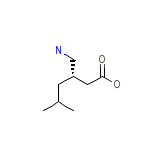Pregabalin




Pregabalin Brand names, Pregabalin Analogs
Pregabalin Brand Names Mixture
- No information avaliable
Pregabalin Chemical_Formula
C8H17NO2
Pregabalin RX_link
http://www.rxlist.com/cgi/generic4/lyrica.htm
Pregabalin fda sheet
Pregabalin msds (material safety sheet)
Pregabalin Synthesis Reference
No information avaliable
Pregabalin Molecular Weight
159.226 g/mol
Pregabalin Melting Point
No information avaliable
Pregabalin H2O Solubility
No information avaliable
Pregabalin State
Solid
Pregabalin LogP
0.844
Pregabalin Dosage Forms
Capsule
Pregabalin Indication
For management of neuropathic pain associated with diabetic peripheral neuropathy and postherpetic neuralgia.
Pregabalin Pharmacology
Pregabalin is a new anticonvulsant drug indicated as an add on therapy for partial onset seizures and for certain types of neuropathic pain. It was designed as a more potent successor to a related drug, gabapentin. Pregabalin binds to the alpha2-delta subunit of the voltage-gated calcium channel in the central nervous system. While pregabalin is a structural derivative of the inhibitory neurotransmitter gamma- aminobutyric acid (GABA), it does not bind directly to GABAA, GABAB, or benzodiazepine receptors, does not augment GABAA responses in cultured neurons, does not alter rat brain GABA concentration or have acute effects on GABA uptake or degradation. However, in cultured neurons prolonged application of pregabalin increases the density of GABA transporter protein and increases the rate of functional GABA transport. Pregabalin does not block sodium channels, is not active at opiate receptors, and does not alter cyclooxygenase enzyme activity. It is inactive at serotonin and dopamine receptors and does not inhibit dopamine, serotonin, or noradrenaline reuptake.
Pregabalin Absorption
Well absorbed after oral administration.
Pregabalin side effects and Toxicity
No information avaliable
Pregabalin Patient Information
No information avaliable
Pregabalin Organisms Affected
Humans and other mammals














